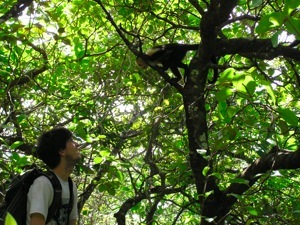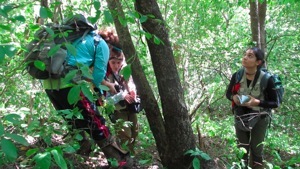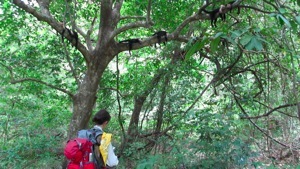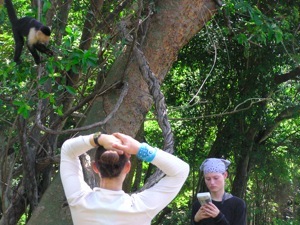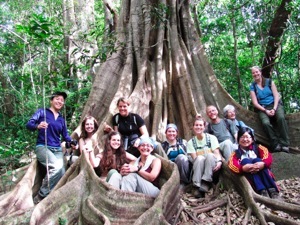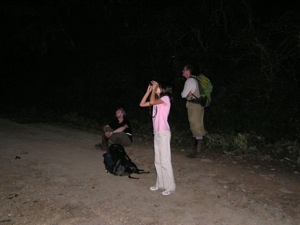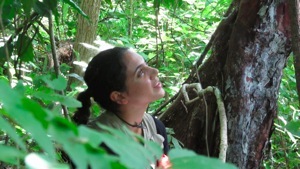Opportunities for field research
The Lomas Barbudal Monkey Project accepts up to 9 volunteer field assistants per year to work as part of our research program, collecting the demographic data, behavioral data and fecal samples that form the core long-term data set for this long-term study of wild capuchin monkeys.
There is no specific application deadline (it is a rolling deadline), and hence there is no specific notification date of the success of the application. When volunteer slots become available, they are filled with the top candidates in the current applicant pool. Applicants should feel free to contact the project with inquiries regarding the probability of obtaining a position, as the time comes when they need to make decisions about other opportunities.
Frequently asked questions:
How much will it cost me to work for this project?
The answer to this question varies according to the level of current grant support. We do our best to cover the basic living and transportation costs for volunteers so that they do not incur debt by working on our project. But in the current funding climate, this is not always possible. When you apply, you should state the amount of financial support that you are capable of supplying from personal sources. Regardless of your answer, we will still seek funding to reimburse you to the best of our abilities. Below is a cost breakdown for the major expenditures:
Cost of food during the work month: $260-$275/person/month
Cost of vacations: $150/person/month (more if you want fancy hotels rather than hostels)
Cost of round trip plane fare: $700-$1300
Health insurance and vaccinations: ? (highly variable)
Personal field gear: (highly variable, but includes things like binoculars, boots, and backpack)
Housing: This is normally covered by the project, but if the size of the staff exceeds the amount of available bedroom space, additional volunteers might have to stay at the park station for ~$14/day.
If grant support is available, field volunteers are typically provided with room and board and (sometimes) a very small stipend that should be sufficient to cover their living expenses. Transportation costs to the field site from the volunteer’s home country up to a certain maximum allowable amount may be reimbursed following the successful completion of the one year minimum appointment (again, depending on the level of grant support we currently have). Volunteers are required to provide their own health insurance and pay for their necessary vaccinations, regardless of whether there is grant support, because these sorts of expenses are generally not considered acceptable budget items in grants.
The most likely scenario is that the project will obtain some grant support, but not enough to cover all expenses for all interns. In this case, funds will be used to cover the costs for people who have already completed the training period, because these people have already proven their commitment and shown that they have the skills necessary to make a positive contribution to the project. So one plausible scenario is that volunteers will be expected to pay approximately $300/month during their training period (which is variable, but typically lasts from 6 weeks to 4 months depending on the level of dedication of the student) and will then have their costs covered for the remainder of their time at the site.
Because the project’s budget and the cost of living in Costa Rica are highly variable from one year to the next, the applicant should inquire about current conditions. The information provided on this website is meant to be used as a rough guideline.
How long do I need to commit?
Because the training process requires 3-5 months, we only accept applicants who are willing to work for a minimum of one year. Sometimes field assistant positions for shorter time periods become available for specialized projects run by graduate students working on the project who have less complex data collection protocols than the core protocol. It is exceedingly costly to the project, both in terms of financial commitment and staff time, to train people who then leave shortly after the training period, rather than paying back the project’s investment by collecting useful data and helping train the next group of interns. Interns should sign contracts with the project only if they intend to honor their commitments and have the integrity to actually do so. The attached guide to working on the monkey project outlines the primary reasons why people have quit in the past. We do our best to vividly and honestly describe the working conditions so that there are no nasty shocks upon arrival. Please carefully consider whether these conditions are a good fit to your abilities before signing on.
What skills and personal qualities do I need to qualify for a position?
(1)Fluency in English is essential, and basic Spanish is highly desirable. Fluent Spanish is necessary for a management position but not for an internship.
(2) You must be in excellent physical shape, as we must hike for 13 hours/day in rugged terrain, crawling through barb wire fences and thornbrush and climbing cliffs several times a day. A tolerance for extreme heat and wet feet is necessary.
(3) You should have a high tolerance for being stung and bitten by tropical insects.
(4) You must be able to work and live in close quarters with others and be skilled at the basic tasks required for communal group living (cooking, cleaning, etc.)
Other skills that are desirable but not necessary for all team members as long as one person has them:
(1) A driving license.
(2) Information technology skills (computer trouble shooting)
(3) Handyman skills (home repair, simple car repair)
(4) Knowledge of website design
(5) Computer programming and database management skills.
(6) Environmental education experience
(7) Accounting skills
Prior experience traveling abroad, collecting animal behavior data and/or working with primates are considered assets, but are also not absolutely essential.
What benefits will I obtain by working for this project?
(1) It is hard to imagine any better opportunity to prepare you for graduate school in primatology. These positions are also excellent preparation for future work in animal behavior or conservation. Our past interns have close to a 100% success rate in obtaining admission to graduate programs with funding. See our alumni page for news of what some past interns are doing now.
(2) The privilege of getting to know wild monkeys personally, and to acquire such a detailed knowledge of the problems they face in their daily lives, is a life-altering experience. It is hard to describe succinctly, but we hope that this is conveyed in the book Manipulative Monkeys.
(3) Most interns form close friendships on the project and important contacts that help them in their future careers as primatologists or conservation biologists. The network of former “Lomas moneros” is exceedingly large, and most interns find these contacts to be very useful as well as a lot of fun.
Are there any salaried positions working for the monkey project?
Yes, there are typically 1-3 management positions that come with a modest salary. All management positions include some fieldwork component (i.e. time with the monkeys) in addition to the managerial tasks. Managers are typically selected from the pool of past fieldwork interns.
How do I apply for a fieldwork internship in Costa Rica?
Prior to applying for a volunteer position, we request that potential applicants read the detailed guide describing the working and living conditions at the field site, available on this site. To download the detailed guide, click here.
This photo gallery shows scenes of field assistants working at the site.
If these conditions are acceptable, then the applicant should assemble an application packet including the following materials:
(1)A letter of application that states your reasons for wanting this position and states why you think you are a suitable candidate. This letter should also include a statement of the time period for which you would be available, the length of time you want to stay, and the amount of your expenses that you would be able to cover without additional resources from the project.
(2)A resume or CV that details your past educational, research and work experience. It should also include your contact information (email, Skype and phone).
(3)Unofficial copies of your college transcripts. For those of you applying from outside the US, a transcript is a list of the courses you have taken and the grades/notes/marks received in those classes. If you are from a non-US institution, you should also include a note explaining the grading system in your country.
(4)Names and email addresses of 3 English or Spanish speaking people who can serve as references for you. Do not send pre-written letters, as the project will send them a list of questions. There should be at least one referee from each of the following categories: (a) someone who has supervised your academic work (e.g. a professor or thesis advisor), (b) a work supervisor/employer, and (c) someone who has lived with you in a cooperative living context, preferably while doing fieldwork.
These materials should be sent electronically to Susan Perry at the following address: sperry@anthro.ucla.edu and the subject heading should read “application for field assistant position, Lomas Barbudal.” If there is no subject heading, this message will probably not be read. If you do not get a reply acknowledging receipt of the materials within 3 days, please resend the message.
Once your file is complete, it is possible that you will be selected for a Skype interview. Applicants who show evidence of having read something about the project during their interviews tend to make better impressions than those who have not yet familiarized themselves with the project’s missions and past research.


.jpg)
